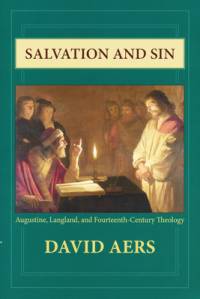Salvation and Sin
- Augustine, Langland, and Fourteenth-Century Theology
- Indbinding:
- Hardback
- Sideantal:
- 302
- Udgivet:
- 15. januar 2022
- Størrelse:
- 152x229x21 mm.
- Vægt:
- 612 g.
- 2-4 uger.
- 15. maj 2025
På lager
Normalpris
Abonnementspris
- Rabat på køb af fysiske bøger
- 1 valgfrit digitalt ugeblad
- 20 timers lytning og læsning
- Adgang til 70.000+ titler
- Ingen binding
Abonnementet koster 75 kr./md.
Ingen binding og kan opsiges når som helst.
- 1 valgfrit digitalt ugeblad
- 20 timers lytning og læsning
- Adgang til 70.000+ titler
- Ingen binding
Abonnementet koster 75 kr./md.
Ingen binding og kan opsiges når som helst.
Beskrivelse af Salvation and Sin
In Salvation and Sin, David Aers continues his study of Christian theology in the later Middle Ages. Working at the nexus of theology and literature, he combines formidable theological learning with finely detailed and insightful close readings to explore a cluster of central issues in Christianity as addressed by Saint Augustine and by four fourteenth-century writers of exceptional power.
Salvation and Sin explores various modes of displaying the mysterious relations between divine and human agency, together with different accounts of sin and its consequences. Theologies of grace and versions of Christian identity and community are its pervasive concerns. Augustine becomes a major interlocutor in this book: his vocabulary and grammar of divine and human agency are central to Aers' exploration of later writers and their works.
After the opening chapter on Augustine, Aers turns to the exploration of these concerns in the work of two major theologians of fourteenth-century England, William of Ockham and Thomas Bradwardine. From their work, Aers moves to his central text, William Langland's Piers Plowman, a long multigeneric poem contributing profoundly to late medieval conversations concerning theology and ecclesiology. In Langland's poem, Aers finds a theology and ethics shaped by Christology where the poem's modes of writing are intrinsic to its doctrine. His thesis will revise the way in which this canonical text is read. Salvation and Sin concludes with a reading of Julian of Norwich's profound, compassionate, and widely admired theology, a reading which brings her Showings into conversation both with Langland and Augustine.
Salvation and Sin explores various modes of displaying the mysterious relations between divine and human agency, together with different accounts of sin and its consequences. Theologies of grace and versions of Christian identity and community are its pervasive concerns. Augustine becomes a major interlocutor in this book: his vocabulary and grammar of divine and human agency are central to Aers' exploration of later writers and their works.
After the opening chapter on Augustine, Aers turns to the exploration of these concerns in the work of two major theologians of fourteenth-century England, William of Ockham and Thomas Bradwardine. From their work, Aers moves to his central text, William Langland's Piers Plowman, a long multigeneric poem contributing profoundly to late medieval conversations concerning theology and ecclesiology. In Langland's poem, Aers finds a theology and ethics shaped by Christology where the poem's modes of writing are intrinsic to its doctrine. His thesis will revise the way in which this canonical text is read. Salvation and Sin concludes with a reading of Julian of Norwich's profound, compassionate, and widely admired theology, a reading which brings her Showings into conversation both with Langland and Augustine.
Brugerbedømmelser af Salvation and Sin
Giv din bedømmelse
For at bedømme denne bog, skal du være logget ind.
